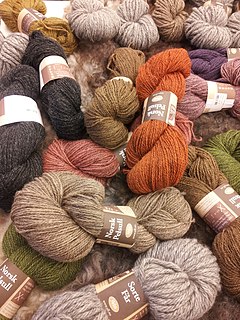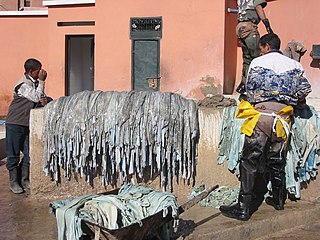The Gul Ahmed Group is a Pakistani company that includes Gul Ahmed Textile Mills, Gul Ahmed Energy and Habib Metropolitan Bank. More recently, a chain of retail outlets has been operating under the name "Ideas by Gul Ahmed". The group's other concerns go by the name of Swisstex Chemicals (Private) Limited, which is a large chemical distribution company that has the sole rights for supplying Ciba Specialty Chemicals in Pakistan. The group has invested in outsourcing information technology with Arwen Technologies.

Khadi or khaddar is handspun, hand-woven natural fiber cloth originating from India, Bangladesh and broadly used in Pakistan and India.This fabric mainly made from cotton.

The National Textile University (NTU) is the premier institution of textile education in Pakistan. It was formerly known as National College of Textile Engineering affiliated with University of Engineering and Technology, Lahore since 1976.
Fine Spinners and Doublers was a major cotton spinning business based in Manchester, England. At its peak it was a constituent of the FT 30 index of leading companies on the London Stock Exchange.
Bagley & Wright was a spinning, doubling and weaving company based in Oldham, Lancashire, England. The business, which was active from 1867 until 1924, 'caught the wave' of the cotton-boom that existed following the end of the American Civil War in 1865 and experienced rapid growth in the United Kingdom and abroad.

The Lancashire Cotton Corporation was a company set up by the Bank of England in 1929, to rescue the Lancashire spinning industry by means of horizontal rationalisation. In merged 105 companies, ending up in 1950 with 53 operating mills. It was bought up by Courtaulds in August 1964.

Regent Mill, Failsworth is a Grade II listed former cotton spinning mill in Failsworth, Oldham, Greater Manchester. It was built by the Regent Mill Ltd. in 1905, but purchased by the Lancashire Cotton Corporation in the 1930s. It was later taken over by the Courtaulds Group. On ceasing textile production it was occupied by Pifco Ltd, and then by Salton Europe Ltd who now occupy this site. It was driven by an 1800 hp twin tandem compound engine by Buckley & Taylor. It became a ring mill with 60,000 spindles in 1915, all provided by Platt Brothers.

Trent Mill was a cotton spinning mill on Duchess Street in Shaw and Crompton, Greater Manchester, England. It was built by F.W. Dixon & Son in 1908. It closed and was taken over by the Lancashire Cotton Corporation in 1929 reopened in 1938 and closed again in 1962, and was demolished in 1967.
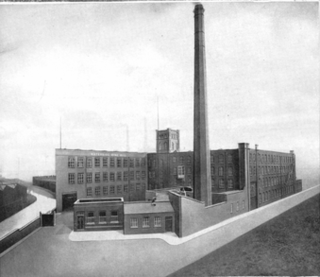
Waterside Mill, Ashton-under-Lyne was a combined cotton spinning weaving mill in Whitelands, Ashton-under-Lyne, Greater Manchester, United Kingdom. It was built as two independent factories. The weaving sheds date from 1857; the four-storey spinning mill dates from 1863. The spinning was taken over by the Lancashire Cotton Corporation in the 1930s. Production finished in the 1950s. Waterside Mill was converted to electricity around 1911.

Blackridings Mill, Oldham was a cotton waste mill lying off Block Lane in the Werneth area of Oldham, Greater Manchester. It was built before 1861 and ceased spinning between 1875 and 1880. It was then used for flock manufacture and processing cotton waste. It was taken over by the Lancashire Cotton Corporation in the 1930s and passed to Courtaulds in 1964. Production finished in 1973, demolished in 1975.
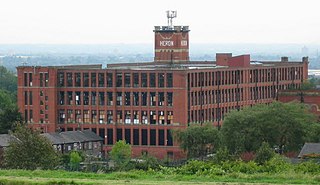
Heron Mill is a cotton spinning mill in Hollinwood, Oldham, Greater Manchester. It was designed by architect P. S. Stott and was constructed in 1905 by the Heron Mill Company Ltd next to Durban Mill. It was taken over by the Lancashire Cotton Corporation in the 1930s and passed to Courtaulds in 1964. Production ended in 1960, and it was used by Courtaulds for offices, warehousing, and some experimental fabric manufacture.
Chenab Group is a Pakistani conglomerate based in Faisalabad, Pakistan. It is one of the largest exporters of home textile products from Pakistan. It was set up in 1974 as Chenab Fabrics & Processing Mills Limited and later converted to Chenab Limited. It was founded by Mian Muhammad Latif and his father Haji Muhammad Saleem who was a cotton industrialist in Toba Tek Singh District.
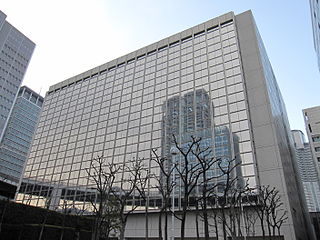
Toyobo Co., Ltd. is one of Japan's top makers of fibers and textiles, including synthetic fibers and natural fibers, such as cotton and wool.
The textile industry in India traditionally, after agriculture, is the only industry that has generated huge employment for both skilled and unskilled labour in textiles. The textile industry continues to be the second-largest employment generating sector in India. It offers direct employment to over 35 million in the country. The share of textiles in total exports was 11.04% during April–July 2010, as per the Ministry of Textiles. During 2009–2010, the Indian textile industry was pegged at US$55 billion, 64% of which services domestic demand. In 2010, there were 2,500 textile weaving factories and 4,135 textile finishing factories in all of India. According to AT Kearney’s ‘Retail Apparel Index’, India was ranked as the fourth most promising market for apparel retailers in 2009.
Ahmed Dawood was a Pakistani industrialist, pioneer merchant and a philanthropist. He was the founder and eponym of the Dawood Group.
The Textile industry in Pakistan is the largest manufacturing industry in Pakistan. Pakistan is the 8th largest exporter of textile commodities in Asia. Textile sector contributes 8.5% to the GDP of Pakistan. In addition, the sector employs about 45% of the total labor force in the country. Pakistan is the 4th largest producer of cotton with the third largest spinning capacity in Asia after China and India and contributes 5% to the global spinning capacity. At present, there are 1,221 ginning units, 442 spinning units, 124 large spinning units and 425 small units which produce textile.

Saif Group is a Pakistani conglomerate company largely focused on textile industry and is owned by Saifullah Khan family.
The textile industry in China is the largest in the world in both overall production and exports. China exported $274 billion in textiles in 2013, a volume that was nearly seven times that of India, the second largest exporter with $40 billion in exports. This accounted for 43.1% of global clothing exports.

Shiva Texyarn Limited is an Indian textile manufacturing company based in Coimbatore, Tamil Nadu. The company is engaged in manufacturing of yarn, fabrics, garments, dry sheets and home textiles in India.






